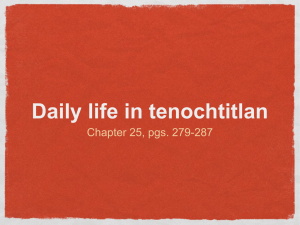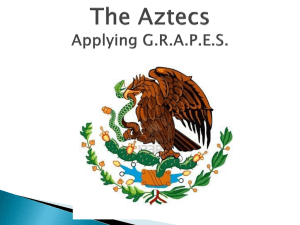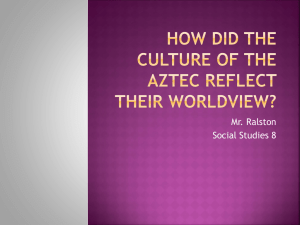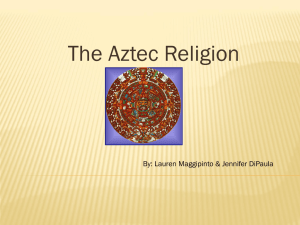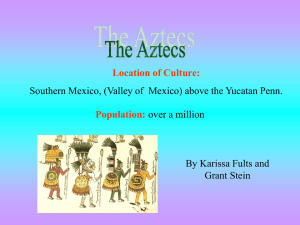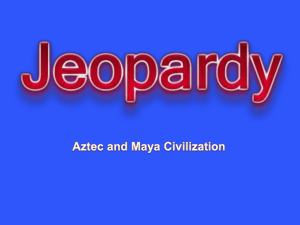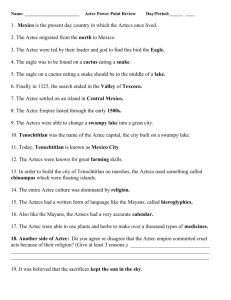Aztec Essay Part 1.doc
advertisement
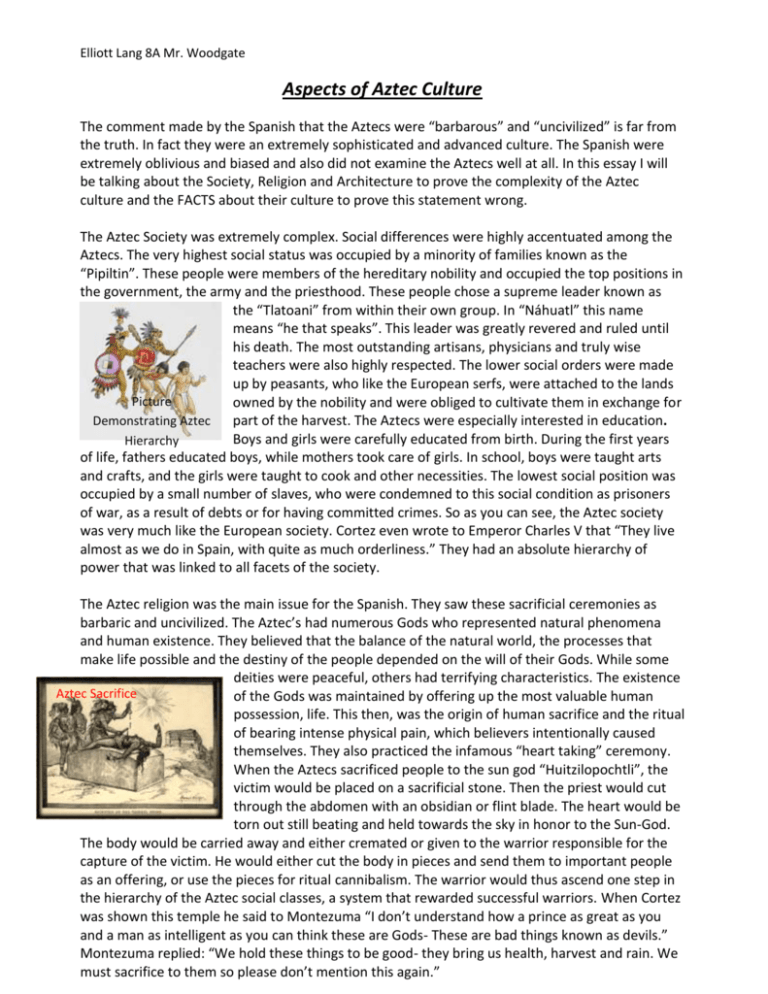
Elliott Lang 8A Mr. Woodgate Aspects of Aztec Culture The comment made by the Spanish that the Aztecs were “barbarous” and “uncivilized” is far from the truth. In fact they were an extremely sophisticated and advanced culture. The Spanish were extremely oblivious and biased and also did not examine the Aztecs well at all. In this essay I will be talking about the Society, Religion and Architecture to prove the complexity of the Aztec culture and the FACTS about their culture to prove this statement wrong. The Aztec Society was extremely complex. Social differences were highly accentuated among the Aztecs. The very highest social status was occupied by a minority of families known as the “Pipiltin”. These people were members of the hereditary nobility and occupied the top positions in the government, the army and the priesthood. These people chose a supreme leader known as the “Tlatoani” from within their own group. In “Náhuatl” this name means “he that speaks”. This leader was greatly revered and ruled until his death. The most outstanding artisans, physicians and truly wise teachers were also highly respected. The lower social orders were made up by peasants, who like the European serfs, were attached to the lands Picture owned by the nobility and were obliged to cultivate them in exchange for part of the harvest. The Aztecs were especially interested in education. Demonstrating Aztec Boys and girls were carefully educated from birth. During the first years Hierarchy of life, fathers educated boys, while mothers took care of girls. In school, boys were taught arts and crafts, and the girls were taught to cook and other necessities. The lowest social position was occupied by a small number of slaves, who were condemned to this social condition as prisoners of war, as a result of debts or for having committed crimes. So as you can see, the Aztec society was very much like the European society. Cortez even wrote to Emperor Charles V that “They live almost as we do in Spain, with quite as much orderliness.” They had an absolute hierarchy of power that was linked to all facets of the society. The Aztec religion was the main issue for the Spanish. They saw these sacrificial ceremonies as barbaric and uncivilized. The Aztec’s had numerous Gods who represented natural phenomena and human existence. They believed that the balance of the natural world, the processes that make life possible and the destiny of the people depended on the will of their Gods. While some deities were peaceful, others had terrifying characteristics. The existence Aztec Sacrifice of the Gods was maintained by offering up the most valuable human possession, life. This then, was the origin of human sacrifice and the ritual of bearing intense physical pain, which believers intentionally caused themselves. They also practiced the infamous “heart taking” ceremony. When the Aztecs sacrificed people to the sun god “Huitzilopochtli”, the victim would be placed on a sacrificial stone. Then the priest would cut through the abdomen with an obsidian or flint blade. The heart would be torn out still beating and held towards the sky in honor to the Sun-God. The body would be carried away and either cremated or given to the warrior responsible for the capture of the victim. He would either cut the body in pieces and send them to important people as an offering, or use the pieces for ritual cannibalism. The warrior would thus ascend one step in the hierarchy of the Aztec social classes, a system that rewarded successful warriors. When Cortez was shown this temple he said to Montezuma “I don’t understand how a prince as great as you and a man as intelligent as you can think these are Gods- These are bad things known as devils.” Montezuma replied: “We hold these things to be good- they bring us health, harvest and rain. We must sacrifice to them so please don’t mention this again.” Elliott Lang 8A Mr. Woodgate Even though these facts seem gruesome and barbaric, they are no different to the way the Christians used to sacrifice animals to God to please him. It is strange that for the Christian faith God gave them his blood to redeem mankind, whereas for the Aztecs, man must give his blood to redeem the Gods. They were just sacrificing them in a slightly more gruesome way. The Aztecs had a very complex religion that was abhorrent to the Spanish Conquistadors but ritualistic and sophisticated in its own right. Aztec Architecture is another great way to prove the comments made by the Spanish were far from the truth. The Aztecs had extremely sophisticated buildings that were examples of their extreme intelligence. They built homes, palaces, sacrificial temples, shrines and many more. In actual fact, early historical accounts of the Spanish first impressions of the Aztec architecture say that the architecture Aztec Temple left them “open mouthed.”This shows that the statement that they were backward was wrong because they are described more as “amazing” and “breathtaking.”They had competitions between their different towns to see who could build the most brilliant temple to honor the Gods. Instead of doing what we do today, which is knocking the old building down and building a new place on top of it, they just built on top of the old version. The most extreme example of this is a temple that had 6 extensions! Their temples were like the Egyptian Pyramids except they had a flat top with compartments on which they performed their sacrifices. Aztec Palace Their Palaces were also great examples of the sophisticated Aztec culture. The palace was a two-story house with a very large courtyard. The walls were covered with extremely high quality artwork. The palaces were usually occupied by the Emperor or “Monarch” but they were sometimes offered to other people of extreme power. The peasants’ and the nobles’ houses were very similar. The only difference was the size and the decoration. The whole house was divided into 2 parts. They were the main home and a steam bath room. It is strange that steam baths were thought to be very therapeutic, so every house had one. The main home was divided into 4 parts; these included the bed area, the family shrine, the kitchen area and also the designated eating area. The Shrines were built in specific positions for specific purposes. They were usually placed on the edge of cliffs and were devoted to specific Gods or people. The Aztec Aztec Shrine sculptures which adorned their temples and other buildings were among the most elaborate in all of America. Their purpose was to please the gods and they attempted to do that in everything they did. Many of the sculptures reflected their perception of their gods and how they interacted in their lives. A Spanish artist “Albrecht Durer” stated: “In all my life, I have never seen anything that so delighted my heart.”The most famous surviving Aztec sculpture is the large circular Calendar Stone, which represents the Aztec universe. I am not sure how the Spaniards could look at all these amazing buildings and make the comment that they were “backward” and “uncivilized”. Initially the early Spaniards may have thought the Aztecs were an extremely barbaric and uncivilized culture, and this was mainly due to the religious, human sacrifice ceremonies. Yet, Elliott Lang 8A Mr. Woodgate when they saw and came to know more about the Aztec civilization they realized they were an extremely sophisticated culture. For example, an early Spanish settler said that “it seemed like an enchanted vision, it was so wonderful that I do not know how to describe this first glimpse of things never heard of, seen or dreamed of before.” It could be said they had a strangely similar religion to the Spaniards, their Society had the same foundations as the Spaniards and their Architecture was extremely advanced. The capital Tenochtitlan was far larger than any contemporary European city but the Aztecs biggest mistake was to welcome the Spanish.
